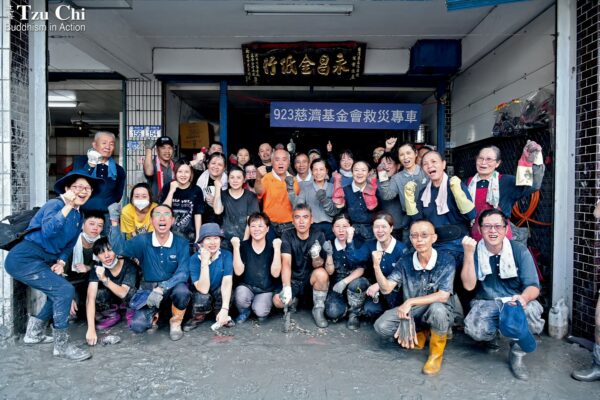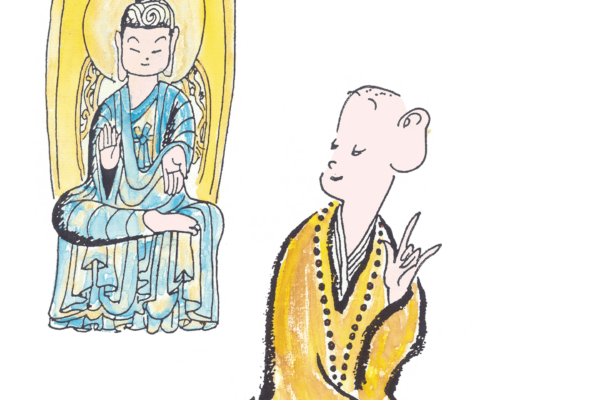Narrated by Xu Xiao-feng
Compiled by Wu Hui-li
Translated by Wu Hsiao-ting
I know the pain of being infected with COVID-19—I’ve contracted it myself. The experience brought home to me the importance of getting vaccinated against the virus. Even though I had been a blue-collar worker and hadn’t made much money, I decided to donate a million Taiwanese dollars to Tzu Chi to help the foundation purchase COVID vaccines.
“COVID-19! Make way!” yelled several health workers in protective clothing as they pushed me from an emergency room down a hallway and into a dedicated elevator for COVID patients. I was lying on a gurney and covered with a clear plastic isolation shield. Emerging from the elevator a moment later, I saw a sign looming ahead: Intensive Care Unit (ICU). “Oh my heavens!” I suddenly thought. “Will I survive the disease and make it safely out?”
As a Tzu Chi commissioner, I had volunteered at a Tzu Chi hospital before. I had even served in an ICU and knew what it was like inside. Patients there were hooked up to IV tubes and connected to all sorts of monitoring devices. They couldn’t even get out of their beds. The ICUs are for seriously ill people, but I had only a slight cough. What was I doing there? Why is COVID so bad and fearful? Unable to resolve these questions in my mind, I began to panic a little.
Aside from sleeping and eating, my time in the ICU consisted of staring at the ceiling. My thoughts often turned to how my family and I had been diagnosed with the coronavirus.
On May 29, 2021, a family member of mine learned from a phone call that he was required to practice 14 days of self-health management because a colleague had been diagnosed with COVID-19. (The guidelines for self-health management include avoiding gatherings, always wearing a mask when away from home, etc.) Taiwan was experiencing an outbreak of the disease at the time. To be on the safe side, I asked my entire family to be tested for the virus. Afterwards, my youngest son learned from a National Health Insurance app that my husband had tested positive for COVID. He tearfully broke the news to me, then asked: “What should we do?” I comforted him and told him not to be afraid. I said that the first order of business was for us to stay away from my husband. I suggested to my son that he sleep in a room upstairs and let his dad sleep in a room one floor down, while I’d sleep on the sofa in the living room and keep an eye on my husband.
My husband was told to quarantine at home until the department of health made further arrangements for him. During this time, I made sure to sterilize every place he passed or touched with disinfectant spray. I was extra cautious. But despite my precautions, as soon as my husband was taken away to a quarantine facility, I began to experience cold symptoms and felt very tired. I called a government hotline for infectious diseases and told them I wanted to take another COVID test. The result came back positive this time. That was on June 7. The very next day, I was driven to a quarantine facility for isolation. On June 16, due to inadequate blood oxygen levels, I was transferred to an ICU at Far Eastern Memorial Hospital in New Taipei City.
Several other loved ones of mine were also diagnosed with COVID-19, one after another. Three of them were sent to a quarantine facility run by Taipei Tzu Chi Hospital and received great care. (The hospital had assumed responsibility for the facility during the outbreak at the request of the New Taipei City government.) Besides three daily vegetarian meals designed by nutritionists, they were given Jing Si Herbal Tea—a health drink containing an effective mixture of herbal medicines developed by Tzu Chi in response to COVID-19. Physicians from Taipei Tzu Chi Hospital contacted them several times via videoconferencing technology even after they were released from quarantine to inquire after their condition. My family was impressed by Tzu Chi’s care for them.
I consider myself fortunate that I had the experience of volunteering at a hospital. It helped me remain calm when COVID hit my family. Another blessing was that all the members of my family diagnosed with the infection were asymptomatic. I couldn’t imagine what it would have been like if any of them had taken seriously ill or worse. Whenever I thought of the time during which our happy family was forced apart by COVID-19, my heart ached and I couldn’t stop from crying.
In the ICU, I listened to the doctors and lay prone on the bed as part of the treatment. The medical team used a high-frequency chest wall oscillation device to remove mucus from my airways, and soon my blood oxygen levels improved. Four days later, a doctor said to me, “Your response has been very good. You are now well enough to be transferred to a regular ward.” The good news instantly perked me up.
The day after I was transferred out of the ICU, I received a phone call from Master De Huai (<wأh) of the Jing Si Abode, conveying Master Cheng Yen’s care for me. I received well-wishes from a staffer at the Tzu Chi Department of Religious Affairs and several other phone calls from fellow volunteers as well. The Abode even gifted me some Jing Si Herbal Tea. Such kind gestures from so many people touched a deep chord in me.
On July 1, I was finally released from quarantine and free to go home. When I was about to leave the hospital, I gave a deep bow to the medical team who had taken care of me to express my gratitude to them. One of them said, “Ma’am, you don’t need to bow. We were just doing what we should do.” “Actually, I had to,” I said in response. “You’re all risking your lives to take care of patients like me. I can’t thank you enough.”
Some people avoid people like me, people who once had COVID-19. They think that we might still pass the virus to them, even though we have fully recovered from the disease. This is a misconception. In fact, people like us have developed COVID antibodies. I’m more worried about those who haven’t received their vaccinations against the infection.
Having suffered from COVID, I realize the importance of getting inoculated. That’s why when I learned that Tzu Chi was purchasing COVID vaccines to help speed up Taiwan’s inoculation drive, I suggested to my husband that we donate a million Taiwanese dollars (US$33,000) to the foundation to help with the effort. “This past year has been a disturbing one due to COVID-19,” I said to him. “When we first got married, we had nothing. We didn’t even dare to dream that we might one day have our own place and a car. But now we have them all. Master Cheng Yen made the decision to buy the vaccines because she wanted to help save lives. Our family knows better than most other families the pain of being infected with COVID. If we donate the money, we can help many people, including our own family.”
I broached this subject several times with my husband, but he always remained silent. I understood his concerns. We were both blue-collar workers when we were younger, and had scrimped and saved to have the money we have now. A security guard now, my husband used to construct formwork at construction sites. I used to work at a factory and I became a cleaning lady when the factory moved abroad. I only retired when my daughter-in-law had her second child so that I could baby-sit the little one.
The idea of donating a million Taiwanese dollars to Tzu Chi came to me during my hospitalization with COVID-19. At the time, I didn’t know for sure if I’d survive the disease, but the experience of being infected fueled my desire to give. Thankfully, my husband later came around to my idea.
Master Cheng Yen often reminds us to tally the value of our lives. I don’t have any specialized skills to contribute to society—all I can do is donate some money. Though our money was hard-earned and took us a long time to save, I knew I’d regret it if I didn’t donate the million dollars. Now that I’ve made the donation, I feel a great sense of fulfillment. It feels great to be alive. Best of all, I’m happy I didn’t wait until it was too late to do good.



